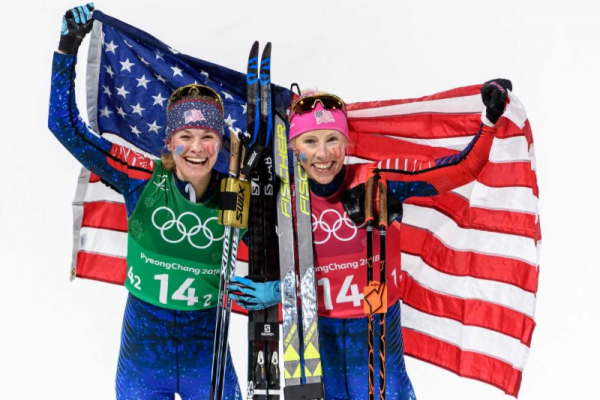
An Alaskan skier made Olympic history on Wednesday, ending the 46-year medal drought for the U.S. women’s cross-country ski team.
Anchorage’s Kikkan Randall and her teammate Jessie Diggins, from Minnesota, won gold in Pyeongchang, South Korea in the cross-country team sprint.
In that event, two skiers take turns skiing 1.25-kilometer laps around the arena, completing three legs each.
And for almost the entire 16-minute race, the Americans were behind the Norwegians and the Swedes.
Jessie Diggins skied the last leg for the Americans and, coming up on the last curve of the race, she slips between Norway and up alongside Sweden’s Stina Nilsson.
With just a few meters to the finish, Diggins out sprinted Nilsson, earning gold by .19 seconds. Kikkan Randall was there at the finish and ran out to Diggins, who collapsed onto the snow.
In a post on Instagram, Diggins credited the entire U.S. women’s cross-country ski with the history victory.
“This team brings out the absolute best in every one of us. Thanks for giving us this chance to do the impossible today!” Diggins said.
Randall shared a similar sentiment online. “Words cannot express how meaningful it’s been to be on this team and to get to represent #teamusa,” Randall posted on her Instagram.
Randall grew up in Anchorage and skies professionally for Alaska Pacific University. She has multiple gold medals from World Cup races but has had her eyes on an Olympic medal since Sochi four years ago.
These are Randall’s fifth and final Olympics.
The Olympic gold for Randall and Diggins ends a 46-year drought for the American women, who had never medaled before at the winter games.
Emily Russell is the voice of Alaska morning news as Alaska Public Media’s Morning News Host and Producer.
Originally from the Adirondacks in upstate New York, Emily moved to Alaska in 2012. She skied her way through three winters in Fairbanks, earning her Master’s degree in Northern Studies from UAF.
Emily’s career in radio started in Nome in 2015, reporting for KNOM on everything from subsistence whale harvests to housing shortages in Native villages. She then worked for KCAW in Sitka, finally seeing what all the fuss with Southeast, Alaska was all about.
Back on the road system, Emily is looking forward to driving her Subaru around the region to hike, hunt, fish and pick as many berries as possible. When she’s not talking into the mic in the morning, Emily can be found reporting from the peaks above Anchorage to the rivers around Southcentral.




